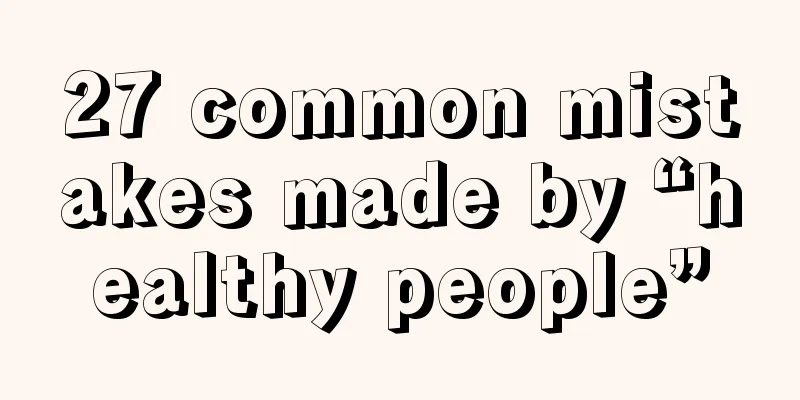27 common mistakes made by “healthy people”

|
Choose healthy foods carefully, exercise hard, and pay attention to your waistline - is this your health action? In fact, this is not the case. Many people who are in great shape (at least for now) still go astray due to their wrong living habits and ideas on the road to health. 1. Always buy organic foods For some organic foods, like beef and strawberries, organic is good. But for other foods, like avocados and eggs, organic makes no difference. Also, don't assume that all organic foods are better than non-organic foods, or that "organic" equals "healthy." In fact, not only are organic foods expensive, but some "organic" instant cereals are even lower in calories, fat, and sugar than their non-organic counterparts. 2. Not having a wide enough social network Although you feel that you are not uncomfortable living alone for a long time, you still need to interact more with your friends. Studies have shown that social networking can be good for your health. Whether it's a book club or playing cards, you should meet with friends regularly. In fact, it doesn't matter what you play together, and it doesn't necessarily mean you have to exercise together, of course that's better. Staying connected to others as you age is also good for your health. 3. Lack of sleep Do you think getting up at 5 a.m. to exercise is a good habit? The doctor says, not really, it’s better for you to get a good night’s sleep at this time. A large amount of research shows that in order to stay healthy, people must get more than seven hours of sleep at night. Lack of sleep has been linked to a range of conditions, including high blood pressure, depression, diabetes and immune disorders. 4. Lack of correct understanding of nutritional supplementation When it comes to vitamins and other trace elements, the more is not necessarily better. Excessive supplementation of these things may even be harmful. In 2011, a study of nearly 40,000 women found that those who regularly took nutrients (particularly iron supplements) actually had a slightly higher risk of death than the controls. The study report did not explain why. "There are no long-term studies showing any clear benefit from taking vitamin and mineral supplements," the doctor said. "If you want to take these things, make sure you follow the recommended daily intake and don't take too much." 5. Undergoing unnecessary medical tests As with vitamin and mineral supplements, more is not necessarily better, and the same is true with various medical tests, especially those requested by the patient themselves, such as coronary artery calcium scores. Doctors say that this test uses CT scans to determine calcium deposits in the heart arteries, which has certain value in diagnosing the condition of certain high-risk patients, but is not meaningful for everyone. But this test exposes the subject to a large amount of radiation - 25-50 times that of a normal chest X-ray. In the United States, in order to draw public attention to 45 medical tests that have been over-abused, many medical expert groups have launched a "wise choice" call to encourage doctors to avoid or reduce tests and procedures that may not be valuable. 6. Begging for antibiotics Many patients, simply out of fear of illness, ask doctors to prescribe antibiotics for symptoms caused by viral infections that are self-healing. Although some doctors are sometimes forced to give patients some antibiotics, taking these drugs is not without risks, ranging from killing the good bacteria in your body to causing drug resistance in bacteria. So instead of putting pressure on your doctor to prescribe antibiotics, let your doctor decide if your symptoms warrant medication. 7. Germophobia There are always those people who can't put down their disinfectants, maybe you are one of them. Yes, we should wash our hands with soap frequently to kill germs and stay healthy. However, there is now evidence that exposure to a certain amount of bacteria can stimulate your immune system (although over-immunity can also lead to allergies), and a completely sterile environment may be harmful. Some people also call this the "hygiene hypothesis." Good bacteria are important for maintaining good health, especially those that live on your skin, in your digestive tract, and in your vagina. Therefore, "germaphobia" is not the same as "health". 8. Abuse of medical care or lack of medical care Once upon a time, when people had little knowledge of medical science, they used acupuncture, herbal medicine or autosuggestion to treat diseases, and those methods sometimes cured diseases just as well as those famous drugs do today. Now, if you view acupuncture as a "fraud," then you may be missing out on this potentially very effective treatment; but at the same time, if you rely too much on so-called "alternative therapies" and try to replace chemical drugs with herbs, then you are still missing out on a good remedy for your disease. We must liberate our minds, seriously discuss with medical experts and understand the pros and cons of various treatments. 9. Delay in medical treatment You look healthy, so a little chest pain could be acid reflux? Weakness and confusion are unlikely to be a stroke? Really? Wrong! People often ignore or delay important symptoms and give incorrect interpretations of these important signals. In fact, in these cases, permanent damage to the heart or brain tissue can be avoided if aggressive treatment is given. Doctors often say that "time is life", which means that for heart disease or stroke, the earlier the treatment, the less tissue loss and the better the treatment outcome. Therefore, if you have the first symptoms of a heart attack or stroke, do not delay. 10. Exercising just to lose weight Regular physical activity is important for staying healthy and maintaining your weight, but it won't help unless you reduce the amount of calories you eat. The doctor said, "Some patients exercise until they are on the verge of death, but they always cannot achieve the desired effect and are puzzled by this." This is true, because exercise increases appetite, and these people want to reward themselves with a sumptuous meal after exercise, or both of these factors exist at the same time, causing them to eat more and exceed the calories burned by exercise. 11. Neglecting sodium intake People focus on calorie intake and avoid foods high in saturated fat, but what about sodium? This ingredient in food is often overlooked. High sodium intake is closely linked to high blood pressure, and the average sodium intake of Americans already far exceeds the recommended daily intake. Excess sodium intake often comes from packaged, prepared foods, from pasta sauces to frozen meals. Therefore, when purchasing food, be sure to pay attention to the sodium content on the label. The Institute of Medicine recommends that adults should consume less than 2,300 mg of sodium per day, and less than 1,500 mg for people over 51, blacks, and those who already have diabetes and high blood pressure. |
<<: The benefits of listening to music
>>: Itching on the body indicates ten kinds of diseases
Recommend
What's the matter with the dull pain in the right chest
The human body is full of various nervous systems...
How to judge whether a person has mental problems
Although we all know that mental illness is relat...
What is the duration of intravenous treatment for nasopharyngeal carcinoma?
At present, there are endless diseases that will ...
What are the methods to repair the stratum corneum
The facial skin of people with thin stratum corne...
What are some blood-replenishing soups? How to make blood-replenishing soup
When it comes to blood supplementation, it will b...
What are the typical symptoms of phv virus infection
Genital warts caused by HPV virus infection have ...
What is the cure rate of nasopharyngeal carcinoma and how to treat it
What is the cure rate of nasopharyngeal carcinoma...
At night, my whole body itches and I scratch it and itches
Many times, due to not paying attention to person...
Can washing your face with milk remove acne?
Although washing your face with milk can remove d...
Take care of yourself and prevent lung cancer
In recent years, lung cancer has become one of th...
What are the effects and functions of soaking your feet in leeks?
Nowadays, many people have the habit of soaking t...
How to treat colon cancer
What is the best way to treat colon cancer? Colon...
What causes lymph node acne?
When we have acne on our body, we will feel very ...
What are the late symptoms of nasopharyngeal carcinoma?
The main manifestations of late-stage nasopharyng...
What are the symptoms of breast cancer?
What are the symptoms of breast cancer? Breast ca...









